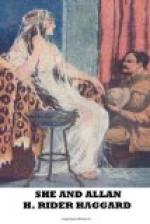“Nay,” I answered, “he who lent me this carving for a while, charged me that except in emergency and to save others, I must wear it night and day till I returned it to his hand, saying that if I parted from it fortune would desert me. I believe none of this talk and tried to be rid of it, whereon death drew near to me from a snake, such a snake as I see you wear about you, which doubtless also has poison in its fangs, if of another sort, Ayesha.”
“Draw near,” she said, “and let me look. Man, be not afraid.”
So I rose from my chair and knelt before her, hoping secretly that no one would see me in that ridiculous position, which the most unsuspicious might misinterpret. I admit, however, that it proved to have compensations, since even through the veil I saw her marvellous eyes better than I had done before, and something of the pure outline of her classic face; also the fragrance of her hair was wonderful.
She took the talisman in her hand and examined it closely.
“I have heard of this charm and it is true that the thing has power,” she said, “for I can feel it running through my veins, also that it is a shield of defence to him who wears it. Yes, and now I understand what perplexed me somewhat, namely, how it came about that when you vexed me into unveiling—but let that matter be. The wisdom was not your own, but another’s, that is all. Yes, the wisdom of one whose years have borne him beyond the shafts that fly from woman’s eyes, the ruinous shafts which bring men down to doom and nothingness. Tell me, Allan, is this the likeness of him who gave it to you?”
“Yes, Ayesha, the very picture, as I think, carved by himself, though he said that it is ancient, and others tell that it has been known in the land for centuries.”
“So perchance has he,” she answered drily, “since some of our company live long. Now tell me this wizard’s names. Nay, wait awhile for I would prove that indeed you are his messenger with whom I may talk about the dead, and other things, Allan. You can read Arabic, can you not?”
“A little,” I answered.
Then from a stool at her side she took paper, or rather papyrus and a reed pen, and on her knee wrote something on the sheet which she gave to me folded up.
“Now tell me the names,” she said, “and then let us see if they tally with what I have written, for if so you are a true man, not a mere wanderer or a spy.”
“The principal names of this doctor are Zikali, the Opener-of-Roads, the ‘Thing-that-should-never-have-been-born,’” I answered.
“Read the writing, Allan,” she said.
I unfolded the sheet and read Arabic words which meant, “Weapons, Cleaver-of-Rocks, One-at-whom-dogs-bark-and-children-wail.”
“The last two are near enough,” she said, “but the first is wrong.”
“Nay, Ayesha, since in this man’s tongue the word ‘Zikali’ means ‘Weapons’”; intelligence at which she clapped her hands as a merry girl might do. “The man,” I went on, “is without doubt a great doctor, one who sees and knows things that others do not, but I do not understand why this token carved in his likeness should have power, as you say it has.”




